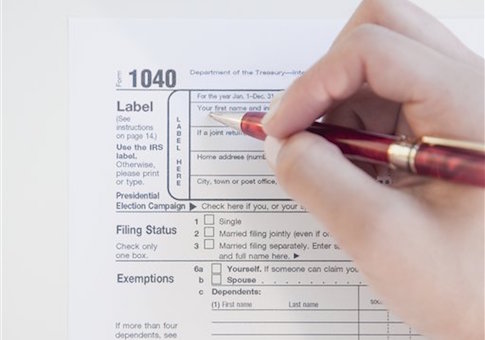The Internal Revenue Service does not notify taxpayers if their child's identity was stolen to commit fraud, according to an audit from the Government Accountability Office.
Criminals sometimes obtain an individual's information—such as a Social Security number or date of birth—and uses it to file a fraudulent tax return to receive a refund.
While the IRS does notify primary and secondary taxpayers if they are victims in an identity fraud case, it does not do this for dependents. IRS officials claim that if a child's Social Security number is used as a dependent on a fraudulent return, he or she is not considered a victim by the agency.
Auditors found that in one identity fraud case, the IRS did not notify the taxpayer that the thief had also stolen their child's identity to use in a fraudulent return.
"By not notifying taxpayers that their dependents' information may have been used to commit fraud, IRS is limiting taxpayers' ability to take action to protect their dependents' identity," the auditors state.
Auditors also found that weaknesses in the agency's internal control processes leave the IRS vulnerable to fraudsters claiming refunds. In interviews with the Government Accountability Office, IRS employees disclosed that they may release refunds even if there are notices on the account stating the tax return is under review for identity theft. They also may release refunds if there are indications that two returns have been filed for one taxpayer.
In one instance, the IRS issued a refund of $9,990 even though it was flagged as a potential identity fraud case. "IRS does not have sufficient data to monitor whether fraudulent refunds are released before a case is closed," the report states. "Protecting federal dollars, while enhancing IRS's case management and protecting taxpayer dependents, can help bolster the public's confidence in the tax system."
The auditors noted that taxpayers' confidence in the IRS would increase if the agency's customer service improved.
"In 2015, we reported that IRS provided the lowest level of telephone service during fiscal year 2015 compared to prior years," the report states. "Callers experience long wait times and only 38 percent of callers who wanted to speak with an IRS assistor reached one." While that number increased to 72 percent in 2016, it still remains lower than prior years.
Auditors suggested that the IRS create an online dashboard, a central location for the agency to provide taxpayers with customer service information about the type and level of service to expect. Auditors asked the IRS why it had not implemented a dashboard. Officials said they were worried such a tool would lead taxpayers to call the IRS instead of remaining online, where it's less expensive for the IRS to offer customer service.
"IRS still faces challenges in providing online services and processing correspondence in a timely manner," the auditors state. "While IRS has taken steps to strategically manage its operations, information about IRS's expected performance is not easily accessible to taxpayers, which limits their ability to make more informed decisions about how and when to contact IRS."
In response, an IRS spokesman said that he agreed with the auditors suggestion to make a dashboard and intends to increase awareness of fraudsters obtaining children's sensitive data.
"We agree there are benefits to improving awareness of the need to protect dependent accounts from potential fraud and will revise applicable notices to alert taxpayers to that point," said John Dalrymple, deputy commissioner for services and enforcement at the IRS. "We will also supplement information on IRS.gov to provide more detailed information on the topic."
